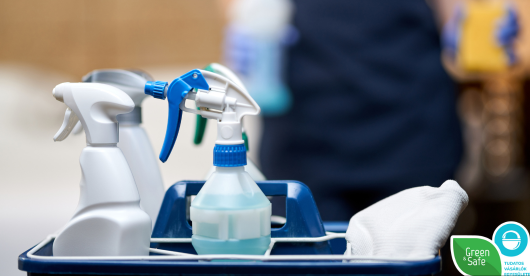
Eco Cleaning is unstoppable – but unfortunately greenwashing too
The market of detergents sold as environmentally friendly expanded by a further 16 percent in 2022, doubling the total turnover in the last 3 years; the market amounted to almost HUF 8.4 billion last year, according to a recent market study done by the Association of Conscious Consumers. The results clearly show that manufacturers respond quickly to consumer needs. However, as the range of products with authentic certification has expanded, greenwashed products of often-unverifiable claims have been responsible for the major part of the resounding success among customers.
A growing number of detergents have been sold as environmentally friendly as consumers too are looking for these. No wonder, if you consider the fact that
- 88% of Hungarians are concerned about the health effects,
- 87% are concerned about the environmental effects of the chemicals in products.
However, if we take a hard look at the numbers, we have no reason to be fully happy, as
- about two-thirds of the increase can be attributed to products sold as “eco” without credible certification, in some cases even with misleading claims.
- The market share of products with an authentic certification has stagnated at 1.9 percent for the second consecutive year.
- The segment of products that consider themselves environmentally friendly already accounts for 4.8 percent of the market.
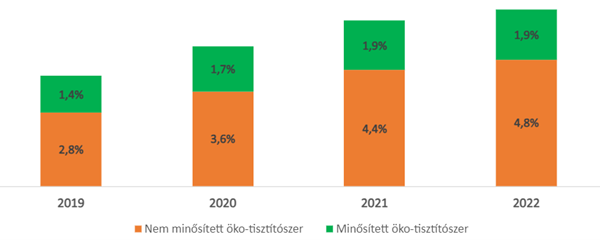
Figure 1. Evolution of the market share of eco-cleaning products (2019-2022)
Companies have been trying to make use of the green wave
The Association of Conscious Consumers has been following the market trends and figured out which aspects are worth paying attention to if you want to get the real eco product instead of the fake one.
The positive piece of news is that in 2022 it was the growth of the “green” products in almost all detergent categories leading to the expansion of the market as a whole. (Figure 2) However, the mentioned “green” products driving the market are often those products that operate with unsubstantiated, suggestive visual or text messages.
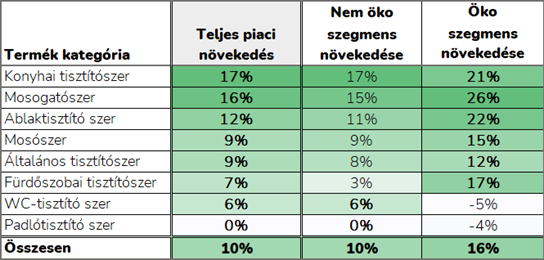
Figure 2 Turnover expansion of the Hungarian detergent market by segment – 2022
(Source: Nielsen)
In 2022, we saw the largest turnover increase on the market of washing-up liquids and on the market of eco-friendly window cleaners; consumers spent 22-26% more money on these compared to 2021. Nevertheless, customers spent more money on self-proclaimed eco products than on products with an authentic eco label; the turnover growth of the former reached 25%-30%.
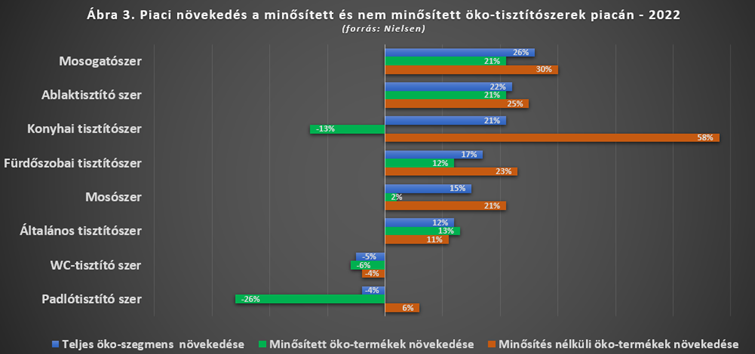
The segment of kitchen cleaning products showed a very similar growth of 21 percent. In this segment, non-certified, often misleading eco products show a spectacular success, even more so than in other segments. In 2022, they increased their turnover by about 58 percent, while their certified counterparts lost 13 percent of their turnover.
“It is extremely worrisome that cleaning agents are marketed as green using eco-friendly expressions and visual representations. These claims are in many cases not verified by an independent certification body. The EU Ecolabel certification is, for example, checked by an independent organization. Companies that do not have their products certified by an independent body take advantage of consumers’ growing environmental sensitivity, but do not prove that they have in fact earned the trust of consumers. They often explicitly mislead customers.”
As Emese Gulyás from the Association of Conscious Consumers comments on the results.
What does the customer see?
Non-certified “green” cleaning detergents most often highlight plant-based ingredients and recycled packaging on their label. Also, these products often refer to “degradable fragrances” or “100% compostability”. These info items can easily mislead the customer and make them believe that what they see is an eco-product. The truth, however, is that the claims apply to one single feature of the product (if at all), in contrast to products certified with the eco-label. Visual impression (e.g. green packaging, plant motives on the logo or packaging) is often used to distract consumers from the major factors of the environmental impact.
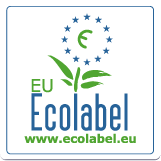 The benefits of the EU Ecolabel have been recognized by an increasing number of large manufacturers and they have got one or two of their brands certified, although often one variant only of their brand. Thus, again, pushing the responsibility to the customer who must be alert enough to be able to distinguish between products of the same brand and recognize the misleading packaging that suggest the same eco-friendliness as the real eco product.
The benefits of the EU Ecolabel have been recognized by an increasing number of large manufacturers and they have got one or two of their brands certified, although often one variant only of their brand. Thus, again, pushing the responsibility to the customer who must be alert enough to be able to distinguish between products of the same brand and recognize the misleading packaging that suggest the same eco-friendliness as the real eco product.
Some of the private label products in retail chains are advertised as eco, but few actually have an eco-certification. Often, these items make advantage of their recycled packaging and so they are placed on the shelf right next to their (real) eco-certified competitors.
Certified green claims: EU Ecolabel
The EU Ecolabel is awarded to those products and services which main environmental impacts are significantly reduced in comparison to similar products and services on the market. An additional advantage over many other eco-labels is that the criteria are laid down in legislation and constantly monitored by independent experts, ie the authentication process is not associated with the manufacturer.
Products must meet strict criteria, and some of the goods cannot or do not want to meet such criteria. Therefore, manufacturers try to sell their goods as eco-products using various tricks, including highlighting pseudo-eco criteria, “greening” the packaging or even applying eco-label-like icons.
What should anyone looking for a real eco-product pay attention to?
According to the results of a study published by the EU, the practice of greenwashing has been ever more widespread in the last few years. The survey has found that in 42% of the cases the “green” claims were exaggerated, false (presumably had no real background) or deceptive. Hungarian market trends seem to be very similar to the trend suggested by the survey. So let’s see in which cases you should suspect that you’re facing greenwashing:
- Almost all eco and non-certified eco products have partially or completely recycled packaging, and manufacturers are always keen to highlight this feature. While this feature does have environmental benefits, in fact it tells you nothing about the detergent (ingredients). Don’t be fooled! Look for the eco label.
- Another characteristic of non-certified, probably misleading, eco-products is that manufacturers refer to natural or biodegradable ingredients. Often, however, it is not these ingredients being reponsible for the significant environmental impact.
- There is a growing number of cleaning agents highlighting the word ‘vegan’ on their packaging. The vegan logo indicates that the product does not contain any animal-derived ingredients or animal by-products and had not been tested on animals. A list of certified, authentic vegan logos can be found here. However, there is no authentic certification behind most of the recent vegan logos. They do not mention, for example, whether the product had been tested on animals during the development / production. And, of course, the single “vegan” certification does not tell you either whether the product is fundamentally environmentally friendly or not.
- In a constantly growing market it’s getting harder to stand out, which is why we can come across labels such as “solar-powered” or “environmentally friendly product”. If these products don’t have an authentic, third party certified label besides these claims, don’t believe they’re completely environmentally friendly.
The above adjectives always highlight one single feature of the product, but do not say anything about whether the product as a whole is greener than the others. This advantage has, however, been proven for products with official EU Ecolabel certification.
Authentic eco-products also stand out in terms of efficiency
And why choose certified eco-products? It is a common misconception that eco-products are functionally not as effective as their competitors, the commercial counterparts. This has been rebutted by the Laboratory Product Tests of the Association of Conscious Consumers. The EU Ecolabelled brands were ranked among the best in the laundry detergent, washing-up liquid and general surface cleaning categories. The EU Ecolabel is also a guarantee of high efficiency, so you may be less disappointed if you opt for the ecolabel instead of something else…
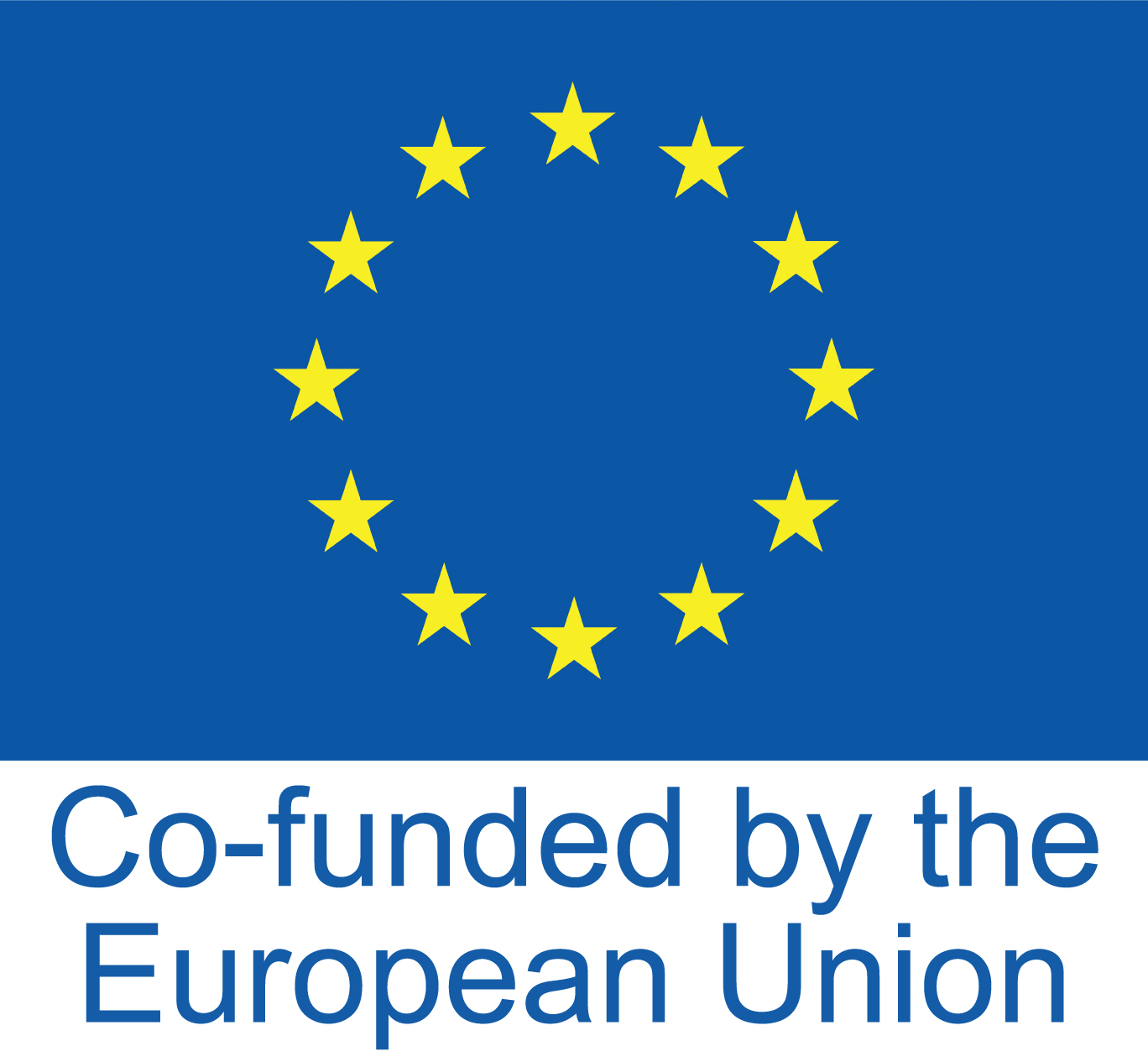
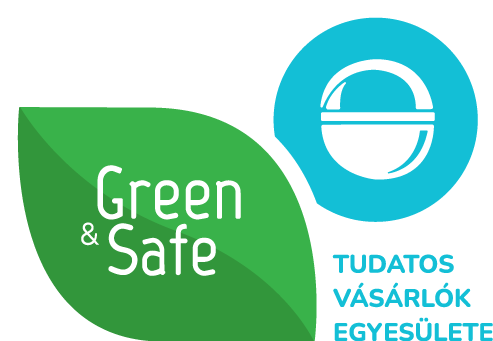
The campaign is supported in the framework of Green&Safe LIFE-styles project. The project is supported by the LIFE programme of the European Union and co-financed by the Hungarian Ministry of Agriculture. Project number: ENV GIE HU000622


